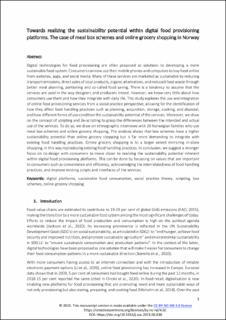| dc.contributor.author | Heidenstrøm, Nina | |
| dc.contributor.author | Hebrok, Marie | |
| dc.date.accessioned | 2021-10-19T10:41:35Z | |
| dc.date.available | 2021-10-19T10:41:35Z | |
| dc.date.created | 2021-08-03T17:38:52Z | |
| dc.date.issued | 2021-07-04 | |
| dc.identifier.issn | 2352-5509 | |
| dc.identifier.uri | https://hdl.handle.net/11250/2823850 | |
| dc.description.abstract | Digital technologies for food provisioning are often proposed as solutions to developing a more sustainable food system. Consumers can now use their mobile phones and computers to buy food online from websites, apps, and social media. Many of these services are marketed as sustainable by reducing transport emissions, direct sales of local products, organic alternatives, and reduced food waste through better meal planning, portioning and so-called food saving. There is a tendency to assume that the services are used in the way designers and producers intend. However, we know very little about how consumers use them and how they integrate with daily life. This study explores the use and integration of online food provisioning services from a social practice perspective, allowing for the identification of how they affect food handling practices such as planning, acquisition, storage, cooking, and disposal, and how different forms of use condition the sustainability potential of the services. Moreover, we draw on the concept of scripting and de-scripting to grasp the differences between the intended and actual use of the services. To do so, we draw on ethnographic interviews with 20 Norwegian families who use meal box schemes and online grocery shopping. The analysis shows that box schemes have a higher sustainability potential than online grocery shopping but is far more demanding to integrate with existing food handling practices. Online grocery shopping is to a larger extent mirroring in-store shopping, in this way reproducing existing food handling practices. In conclusion, we suggest a stronger focus on co-design with consumers to move closer to realizing the sustainability potential inherent within digital food provisioning platforms. This can be done by focusing on values that are important to consumers such as convenience and efficiency, acknowledging the interrelatedness of food handling practices, and improve existing scripts and interfaces of the services. | en_US |
| dc.description.sponsorship | This work was supported by the PLATEFORMS project (2017-2021) funded by the Research Council of Norway [grant number 284529], through the EU H2020 ERA-NET Co-Fund on sustainable Food Production and Consumption. | |
| dc.language.iso | eng | en_US |
| dc.publisher | Elsevier | en_US |
| dc.relation.ispartofseries | Sustainable Production and Consumption; | |
| dc.rights | Attribution-NonCommercial-NoDerivatives 4.0 Internasjonal | * |
| dc.rights.uri | http://creativecommons.org/licenses/by-nc-nd/4.0/deed.no | * |
| dc.subject | Digital platforms | en_US |
| dc.subject | Sustainable food consumption | en_US |
| dc.subject | Social practice theories | en_US |
| dc.subject | Scripting | en_US |
| dc.subject | Box schemes | en_US |
| dc.subject | Online grocery shopping | en_US |
| dc.title | Towards realizing the sustainability potential within digital food provisioning platforms: The case of meal box schemes and online grocery shopping in Norway | en_US |
| dc.type | Peer reviewed | en_US |
| dc.type | Journal article | en_US |
| dc.description.version | publishedVersion | en_US |
| cristin.ispublished | true | |
| cristin.fulltext | original | |
| cristin.qualitycode | 1 | |
| dc.identifier.doi | https://doi.org/10.1016/j.spc.2021.06.030 | |
| dc.identifier.cristin | 1923729 | |
| dc.source.journal | Sustainable Production and Consumption | en_US |
| dc.source.pagenumber | 35 | en_US |
| dc.relation.project | Norges forskningsråd: 284529 | en_US |

